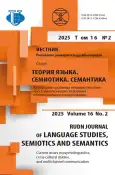Значение как механизм трансформации смыслов и структурирования смыслового пространства дискурса
- Авторы: Малахова В.Л.1
-
Учреждения:
- МГИМО МИД России
- Выпуск: Том 16, № 2 (2025): Актуальные проблемы психолингвистики, кросс-культурных исследований и поликанальной коммуникации
- Страницы: 502-513
- Раздел: ТЕОРИЯ ЯЗЫКА
- URL: https://journal-vniispk.ru/2313-2299/article/view/323526
- DOI: https://doi.org/10.22363/2313-2299-2025-16-2-502-513
- EDN: https://elibrary.ru/DYFWWX
- ID: 323526
Цитировать
Полный текст
Аннотация
Формирование смысла - сложный, многогранный процесс, в основе которого лежит трансформация значений разных типов. Предложен целостный анализ одной из важнейших языковых проблематик: значения и смысла. С учетом этого автор описывает значения как развивающуюся (динамичную) систему, что обусловливает новизну исследования. Объектом выступают значения разных типов; в качестве основных автор выделяет семантическое, семантико-синтаксическое, логико-семантическое и прагматическое значения. Целью исследования является определение специфики каждого типа значений и степень их участия в формировании смыслов и структурировании когерентного смыслового пространства дискурса. Основные методы исследования - прагмасемантический анализ и дискурс-анализ, применение которых позволяет раскрыть механизмы формирования значений и смыслов дискурса, установить соотношение между разноуровневыми значениями и создаваемым прагматическим эффектом, выявить потенциал языковых средств конструирования значений и смыслов. Это обусловливает актуальность исследования, поскольку система значений представлена с функциональной точки зрения построения смыслового пространства дискурса. Результатами исследования является следующее. Семантика задает исходные параметры значений, которые в процессе контекстуальной актуализации дополняются синтаксическими и логическими параметрами. Происходит построение семантико-синтаксического значения и его превращение в логико-семантическое. Далее под действием контекстуального и экстралингвистического факторов происходит приращение дополнительных прагматических значений, трансформирующихся в дискурсивные смыслы. Создается определенный прагма-семантический эффект. Автор приходит к заключению о том, что сложная иерархическая трансформация многоуровневых значений приводит к гибридизации смыслов, усложнению отношений и связей дискурса, структурированию его целостного смыслового пространства.
Об авторах
Виктория Леонидовна Малахова
МГИМО МИД России
Автор, ответственный за переписку.
Email: v.l.malakhova@inno.mgimo.ru
ORCID iD: 0000-0002-0261-5493
SPIN-код: 3106-6946
Scopus Author ID: 57221927976
ResearcherId: E-6261-2016
доктор филологических наук, доцент, профессор кафедры английского языка № 5
119454, Российская Федерация, г. Москва, Проспект Вернадского, д. 76BСписок литературы
- Chesnokova, O.S., Khramchenko, D.S., & Kupriyanova, M.E. (2020). Professional discourse: Functional-linguistic perspective (Based on academic discourse). In: Malyuga E. (Ed.) Functional Approach to Professional Discourse Exploration in Linguistics (pp. 21–57). Springer, Singapore. https://doi.org/10.1007/978-981-32-9103-4_2 EDN: VOSSSG
- Cherkunova, M., Ponomarenko, E., & Kharkovskaya, A. (2023). Dynamic and systems features of fiction abstracts discourse from the functional linguosynergetics perspective. In: D. Bylieva & A. Nordmann (Eds.) Technologies in a Multilingual Environment. PCSF 2022. Lecture Notes in Networks and Systems (pp. 90–103). Springer, Cham (Switzerland). https://doi.org/10.1007/978-3-031-26783-3_10 EDN: PYOHPD
- Myaksheva, O.V. (2023). Linguistic Analysis of a literary text as the key to its comprehension: Cognitive and discursive aspect. RUDN Journal of Language Studies, Semiotics and Semantics, 14(3), 704–718. (In Russ.). https://doi.org/10.22363/2313-2299-2023-14-3-704–718 EDN: RIUGZG
- Pradhan, R.Ch. (2019). Mind, meaning and world: A transcendental perspective. Springer.
- Kozlovskaya, E., Kobylko, J., & Medvedev, Y. (2019). Sense-forming function of context in publicistic texts. Russian Journal of Linguistics, 23(1), 165–184 https://doi.org/10.22363/2312- 9182-2019-23-1-165–184. EDN: YZCRVB
- Böttger, H., & Költzsch, D. (2021). Walk’n’Talk: Effects of a communicative strategy. Training, Language and Culture, 5(4), 9–21. https://doi.org/10.1515/cllt-2022-0082 EDN: NIMBRT
- Burton-Roberts, N. (2013). Meaning, semantics and semiotics. In: A. Capone, F.L. Piparo, & M. Carapezza (Eds.) Perspectives on Linguistic Pragmatics. Perspectives in Pragmatics, Philosophy & Psychology (pp. 1–22). Springer: Cham. https://doi.org/10.1007/978-3-319-01014-4_1
- Kirov, E.F. (2019). The meaning of the word in the model of understanding. RUDN Journal of Language Studies, Semiotics and Semantics, 10(4), 761–774. (In Russ.). https://doi.org/10.22363/2313-2299-2019-10-4-761-774. EDN: ZQGPMN
- Dijk, T.A. van. (1978). Issues of text pragmatics. In: Novoe v Zarubezhnoi Lingvistike (Vol. 8. pp. 259–336). Moscow. (In Russ.).
- Alefirenko, N.F. (2013). Sense as linguistic philosophic phenomenon. Tomsk State University Journal of Philology, (1), 5–14. (In Russ.). EDN: TCTBZD
- Gak, V.G. (2009). Language transformations: some aspects of linguistic science at the end of the 20th century: from situation to statement. Moscow: URSS. (In Russ.).
- Chomsky, N. (2000). Language and interpretation. In: N. Chomsky & N.V. Smith (Eds.), New Horizons in the Study of Language and Mind (pp. 46–74). Cambridge: Cambridge University Press.
- Potebnya, A.A. (2007). Thought and language. Moscow: Labyrinth. (In Russ.).
- Deleuze, G. (2011). The logic of meaning, Y.I. Svirsky. (Trans.). Moscow: Akademicheskii Proekt: (In Russ.). EDN: QXABFT
- Maienborn, C., Heusinger, K. von, & Portner, P.H. (2011). Meaning in linguistics. In: C. Maienborn, K. von Heusinger & P.H. Portner (Eds.) Semantics: An International Handbook of Natural Language Meaning. Volume 1. Handbooks of Linguistics and Communication Science (pp. 1–10). Berlin, Boston: De Gruyter Mouton. https://doi.org/10.1515/9783110226614.1
- Kamp, H., & Reyle, U. (1993). From discourse to logic: an introduction to modeltheoretic semantics, formal logic and discourse representation theory. Dordrecht: Kluwer Academic Publishers.
- Alba-Juez, L., & Larina, T. (2018). Language and emotion: Discourse-pragmatic perspectives. Russian Journal of Linguistics, 22(1), 9–37. https://doi.org/10.22363/2312-9182-2018-22-1-9-37 EDN: YVIKJS
- Amaral, P. (2018). Expressive meaning. In: F. Liedtke & A. Tuchen (Eds.) Handbuch Pragmatik (pp. 325–333). Stuttgart: J.B. Metzler. https://doi.org/10.1007/978-3-476-04624-6_32
- Shakhovsky, V.I. (2018). Cognitive matrix of emotional and communicative personality. Russian Journal of Linguistics, 22(1), 54–79. (In Russ.). https://doi.org/.22363/2312-9182-2018-22-1-54-79 EDN: YVIKKK
- Ponomarenko, E.V., Magirovskaya, O.V., & Orlova, S.N. (2020). Introduction: Professional discourse in the focus of functional linguistics. In: E. Malyuga (Ed.) Functional Approach to Professional Discourse Exploration in Linguistics (pp. 1–20). Springer, Singapore. https://doi.org/10.1007/978-981-32-9103-4_1
Дополнительные файлы









